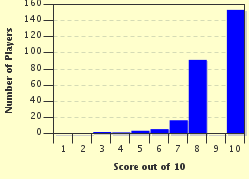Quiz Answer Key and Fun Facts
1. Train pulled by two locomotives
2. Secondary track or line for a train
3. Anything that doesn't stop on the way to the destination
4. Going up an incline
5. Revolving platform used for turning trains
6. Buffer on a train car
7. Line that isn't on a main railway
8. Short haul that paid well
9. Train timetable
10. Railroad employee traveling as passenger
Source: Author
ponycargirl
This quiz was reviewed by FunTrivia editor
NatalieW before going online.
Any errors found in FunTrivia content are routinely corrected through our feedback system.

